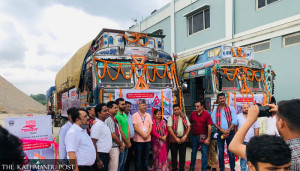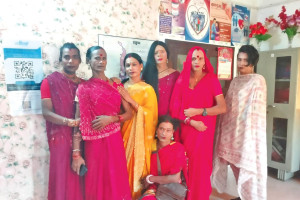Entertainment
Manjushree Thapa’s latest book All of Us in Our Own Lives launched
The recent arrests of journalists, artists and an activist, and the flaring of violence across the Tarai following the protests against the constitution have left the citizenry divided in their opinions.
Sanjit Bhakta Pradhananga
Over phone, on a gloomy Kathmandu morning, Manjushree Thapa is quick to reiterate that one of the most visible changes she has noticed in the Nepali society is how sharply polarised it has become. The recent arrests of journalists, artists and an activist, and the flaring of violence across the Tarai following the protests against the constitution have left the citizenry divided in their opinions.
The anger, she says, is “instantly palpable”.
The author is no stranger to that antagonism herself. Her last interview published in the Kantipur daily earlier this week, generated a lively discussion about why she deserved such a prominent space in the national discourse, with many labelling her “an author born with a silver spoon who mostly lives abroad, and who is detached from Nepal’s ground realities”. “It is indicative of the deeply polarised times that we live in today, there seems to be a war against anyone who is advocating for inclusion of minorities and the disenfranchised,” she muses.
Thapa, who was born into a well-placed Kathmandu family, spent large parts of childhood abroad—living in Canada and the US—before getting MA in English from the University of Washington in Seattle, US.
Yet, for someone who has spent a significant amount of years away (she still splits her time between Toronto and Kathmandu), her writings are still rooted very much to Nepal. Her first book, Mustang Bhot in Fragments, traced the lives of the people and cultures she came across while stationed at Lo Manthang, which had remained closed to the outside world at the time. Her 2005 book, Forget Kathmandu, shortlisted for the esteemed Lettre Ulysses Award, won acclaim for her incisive retelling of the royal massacre and the Maoist insurgency.
The same is true of her latest offering, All of Us in Our Own Lives, launched on Wednesday. The book weaves together the lives of four characters with Nepal’s foreign aid regime serving as the backdrop. Given how divisive the issue of foreign aid currently is, she admits that she will not be surprised if the book gets misconstrued by those with their own agendas. “Everything can and will be misinterpreted,” she says. “This book however is not political. It is a philosophical exploration of the Buddhist concept of interdependence and interconnectedness.”
To many, in a society that is quick to box itself in small, self-limiting corners, the idea that we are interconnected, even if our paths never cross in real life, is lost to deafening, chest-thumping rhetoric. In another parallel reality, the concept might have even been hailed as the silver bullet that could end Nepal’s polarisation. But these are difficult times. “I am waiting to see how many online trolls show up to the launch,” Thapa says, breaking into her habitual chuckle, half-joking.




 10.12°C Kathmandu
10.12°C Kathmandu










